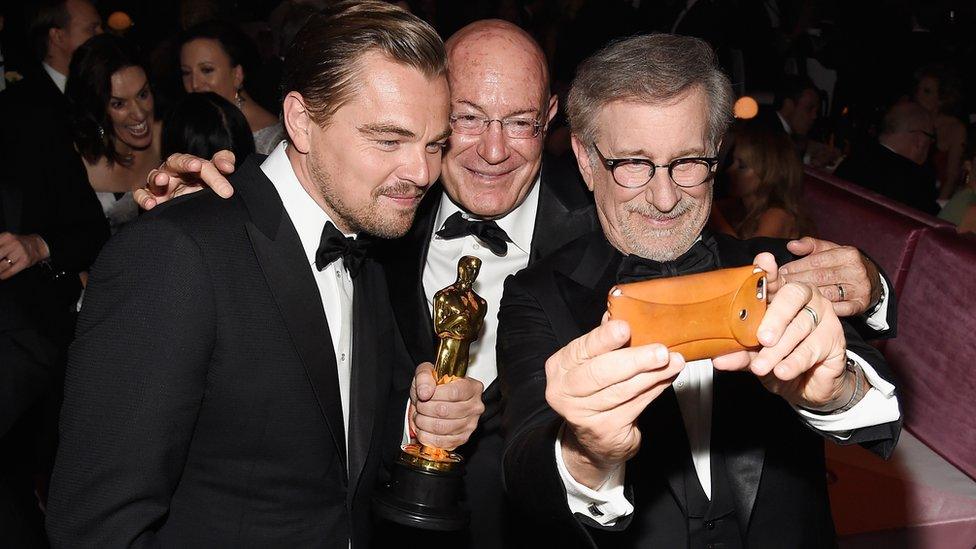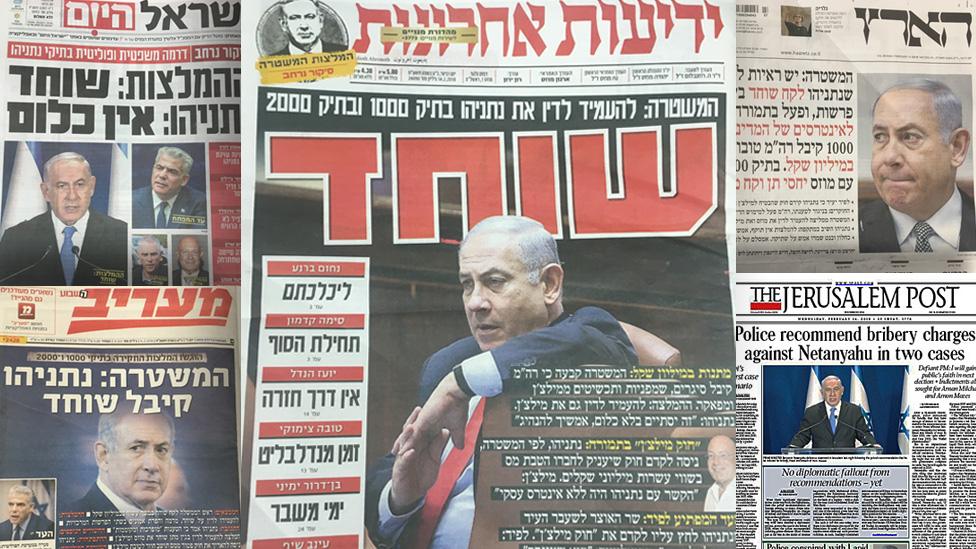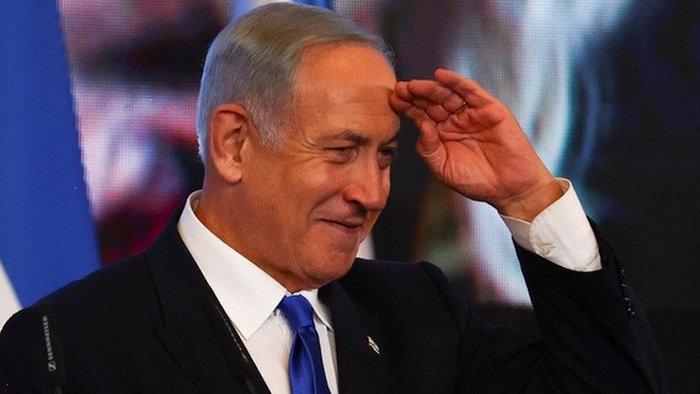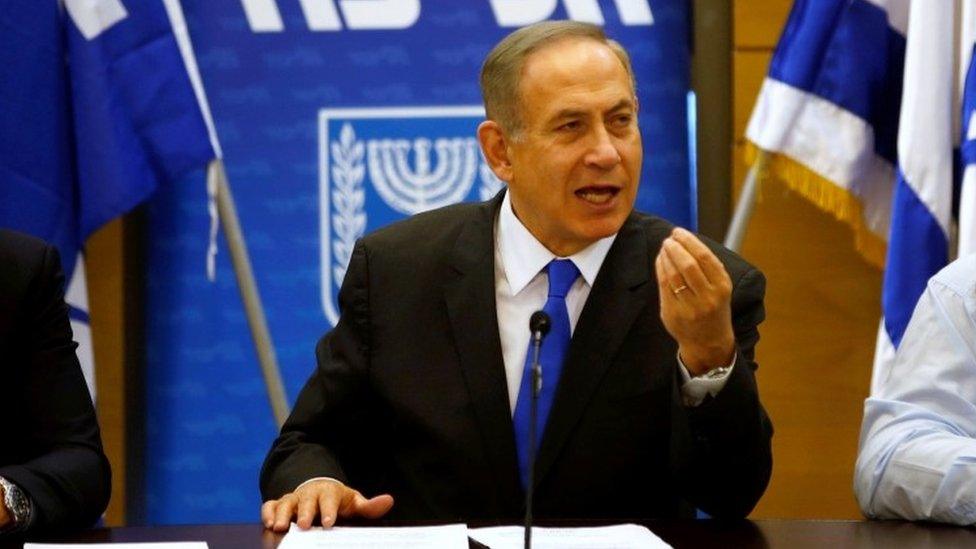Israel PM Netanyahu defiant in face of bribery allegations
- Published
The attorney general's office could take months to decide if Netanyahu should face charges
Israel's PM Benjamin Netanyahu has hit back after police said he should be charged over alleged bribery cases.
He called the allegations "baseless" and said he was certain the truth would be revealed.
His government is "stable", he has insisted, despite criticism from a key member of his coalition.
A police statement on Tuesday said there was enough evidence to indict him for bribery, fraud and breach of trust in two separate cases.
The attorney general's office could take months to decide if Mr Netanyahu should face charges.
The 68-year-old is in his second stint as prime minister, and has served in the role for a total of 12 years.
What was Netanyahu's response?
Benjamin Netanyahu gave a defiant rebuttal of the allegations in a statement broadcast on Israeli television on Tuesday evening.
"Over the years, I have been the subject of at least 15 inquiries and investigations," he said.
"Some have ended with thunderous police recommendations like those of tonight. All of those attempts resulted in nothing, and this time again they will come to nothing."
At an event in Tel Aviv on Wednesday, he repeated his insistence that he would not be resigning.
"I can reassure you that the coalition is stable," he said. "Neither me nor anyone else has plans for elections. We're going to continue to work together for the good of Israeli citizens until the end of the term."
What are the allegations?
One case centres on an allegation that Mr Netanyahu asked the publisher of an Israeli newspaper, Yediot Aharonot, for positive coverage in exchange for help in reining in a rival publication.
Police said the editor of Yediot Aharonot, Arnon Mozes, should also face charges.
Mr Mozes's lawyer said he had a good defence, external, and that after further examination of the evidence "it will become clear that he did not commit a criminal offence".
The second allegation centres on a claim that Mr Netanyahu received gifts worth at least a million shekels ($283,000; £204,000) from Hollywood mogul Arnon Milchan and other supporters.
The Jerusalem Post says the gifts included champagne and cigars, and were given in exchange for help getting Mr Milchan a US visa.
Mr Milchan, the producer of films including Fight Club, Gone Girl and The Revenant, should face bribery charges, police said.

Arnon Milchan (centre) with Leonardo DiCaprio and Steven Spielberg
The police statement said that Mr Netanyahu, after receiving gifts, pushed for the Milchan Law, which would have ensured that Israelis who return to live in Israel from abroad were exempt from paying taxes for 10 years.
The proposal was eventually blocked by the finance ministry.
Mr Milchan's lawyer said the police recommendation "ignored basic facts"., external His client and Mr Netanyahu were long-time friends, he said, and "in this context, gifts were given to the Netanyahu family from time to time, without any business interest".
Police say Mr Netanyahu is also suspected of fraud and breach of trust in a case involving Australian billionaire James Packer.
Israel's Channel 10 reported in December that Mr Packer told investigators he gave the prime minister and his wife Sara gifts.
A spokesman for Mr Packer told Reuters "there is no allegation of wrongdoing" on the part of his client, and both Israeli and Australian police had "confirmed he was interviewed as a witness, not a suspect".
Israeli media say Mr Netanyahu has been questioned by investigators at least seven times.
What has the reaction been?
A key member of the coalition government, Education Minister Naftali Bennett, criticised Mr Netanyahu but said he would stay in the "good government" for now.
"A prime minister is not meant to be perfect or live an over-modest lifestyle, but he needs to be someone people look at and say: "This is how one should act"," he said in a speech in Tel Aviv.
"Taking gifts in large sums over a long period of time is not living up to this standard," he added, while stressing Mr Netanyahu is innocent until proven guilty.
Earlier, Israel's centre-left opposition alliance, the Zionist Union, called on the prime minister to resign.
"The state of Israel needs a leader whose hands are clean and who is solely devoted to the affairs of the country," the group's Eyal Ben-Reuven told The Times of Israel.
Ilan Gilon, of the left-wing Meretz party, said the allegations cast a "heavy shadow" over the prime minister.
But members of Mr Netanyahu's right-wing Likud party have been quick to defend him.
Tourism Minister Yariv Levin said the police statement was a "despicable move" designed to "carry out a government coup against the will of the voter".
What happens now?
A final decision on whether Mr Netanyahu should face charges will come down to the attorney general's office. A decision could take months to reach.
Justice Minister Ayelet Shaked said any prime minister who has been charged should not be obliged to resign.
The next legislative elections are scheduled for November 2019.
Mr Netanyahu heads a fragile coalition, but he appears confident the allegations will not spur new elections.
- Published14 February 2018

- Published21 November 2024

- Published2 January 2017
